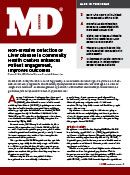Publication
Article
Early Life Cow’s Milk Linked to Increased Asthma Risk
Author(s):
Researchers suggest avoiding cow’s milk formula for newborns in the first 3 days of life.

There could be a connection between food allergies and the development of asthma or recurrent wheeze, especially for cow’s milk, according to new research.
A team, led by Hiroshi Tachimoto, MD, PhD, Division of Molecular Epidemiology, Jikei University School of Medicine, evaluated whether asthma or recurrent wheeze among children were changed by avoiding supplementing breastfeeding with cow’s milk formula (CMF) in the first 3 days of life.
In the randomized, unmasked, clinical trial, the investigators examined 312 newborns at a single university hospital in Japan. The study began in October 2013, with follow-up examinations occurring until January 2020.
The 312 infants in the study all had a risk for atopy. Each newborn was randomized (1:1) and assigned to either a breastfeeding group with or without amino acid-based elemental formula for at least the first 3 days of life or a breastfeeding group with at least 5 mL/d of cow’s milk formula from the first day of life for 5 months. Follow-up examinations for participants showing signs of atopy were conducted at 24 months.
The investigators sought main outcomes of asthma or recurrent wheeze diagnosed by the pediatric allergy specialists from the trial. The researchers also stratified subgroups by serum levels of 25-hydroxyvitamins D and IgE.
A total of 77 (51%) of the infants in the no cow’s milk formula and 81 (53.6%) in the cow’s milk group underwent extended follow-up due to atopic conditions.
Asthma or recurrent wheeze was found in 15 (9.9%) of the children in the no cow’s milk formula group, which was significantly less than the children in the cow’s milk formula group (n = 27 [17.9%]; risk difference, −0.079; 95% CI, −0.157 to −0.002).
For patients with vitamin D levels above the median at 5 months, asthma or recurrent wheeze developed in 5 (6.4%) participants in the no cow’s milk formula group, which was substantially less than in the children in the cow’s milk formula group (n = 17 [24.6%]; risk difference, -0.182; 95% CI, -0.298 to -0.067; P for interaction = 0.04).
In the highest quartile group of total IgE at 24 months, asthma or recurrent wheeze developed in only 2 children (5.3%) in the no cow’s milk formula group, significantly less than the children in the cow’s milk formula group (n = 14; 43.8%; risk difference, -0.385; 95% CI, -0571 to -0.199; P for interaction = 0.004).
“The findings of this study suggest that avoiding CMF supplementation in the first 3 days of life has the potential to reduce the risk of asthma or recurrent wheeze in young children, especially among those with high vitamin D or high IgE levels,” the authors wrote.
The study, “Effect of Avoiding Cow's Milk Formula at Birth on Prevention of Asthma or Recurrent Wheeze Among Young Children,” was published online in JAMA Network Open.





